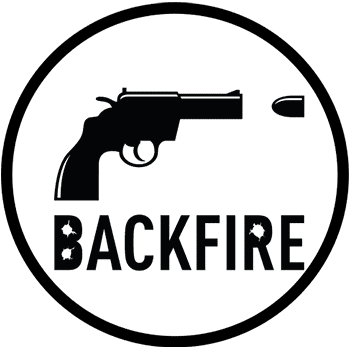Coyote Hunting Gear: Buyer’s guide and my exact gear list
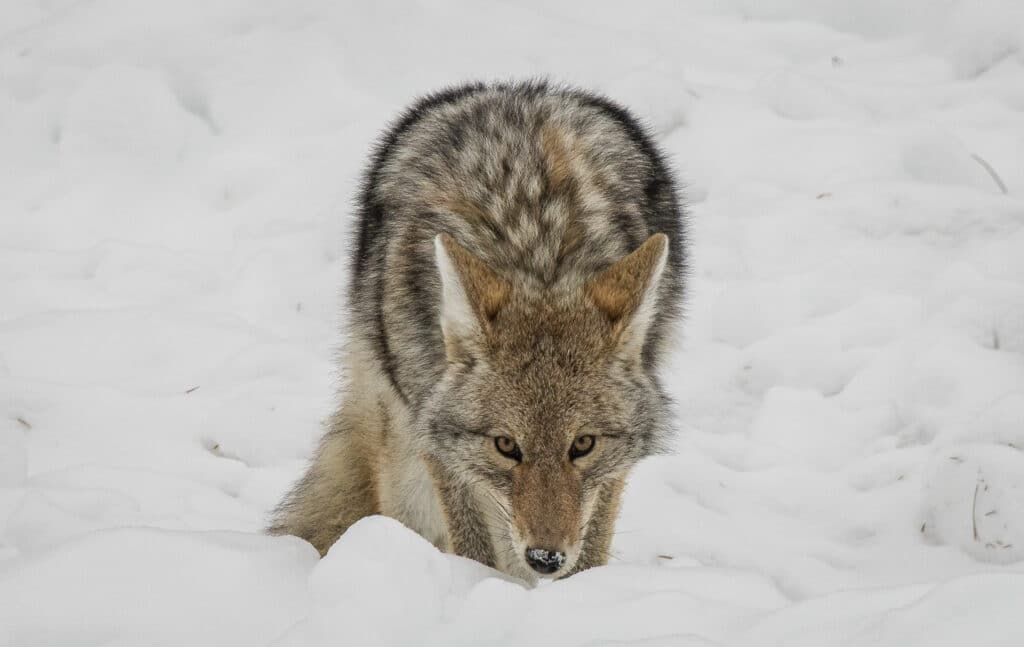
The sheer amount of gear marketed to predator hunters is intimidating, confusing, and hard to sort through. I’ve teamed up with a group of coyote hunters to bring you the best gear, recommended through years of fields testing.
The most essential gear for hunting coyotes is a rifle, camo, and a predator call. If you already have a rifle and camo, $10 will buy a decent call and you will be equipped to begin coyote hunting. Electronic calls are expensive but will sound better and ultimately bring you more success.
Although it can be done quite cheaply, most hunters have between $500 and $1,000 invested in gear, not including their rifle and optics. I’ll go over what people like, what you actually need, and my personal gear list.
My Personal Gear List for Coyote hunting
- DPMS .223 AR-15 W/ 16 inch stainless Bull Barrel, custom camo $850
- Vortex Viper HS 4-16×44 rifle scope $550
- Utg 8-12-inch tactical OP Bipod $50
- Basic nylon rifle sling $10
- M-81woodland camo pants, Jacket, and boonie hat $90
- German Surplus Snow Poncho $30
- Neoprene camo cold-weather facemask $10
- Hunter’s Specialty 5-Color Camo Face Paint $7
- Primos Still Jack rabbit call $9
- Primos Mouse Squeeze call $9
- Repel 100 bug spray (98% DEET) $7
- Hornady Frontier .223 55-grain Spire Point ammo $14
- Snickers Bar (for the munchies) $1.67
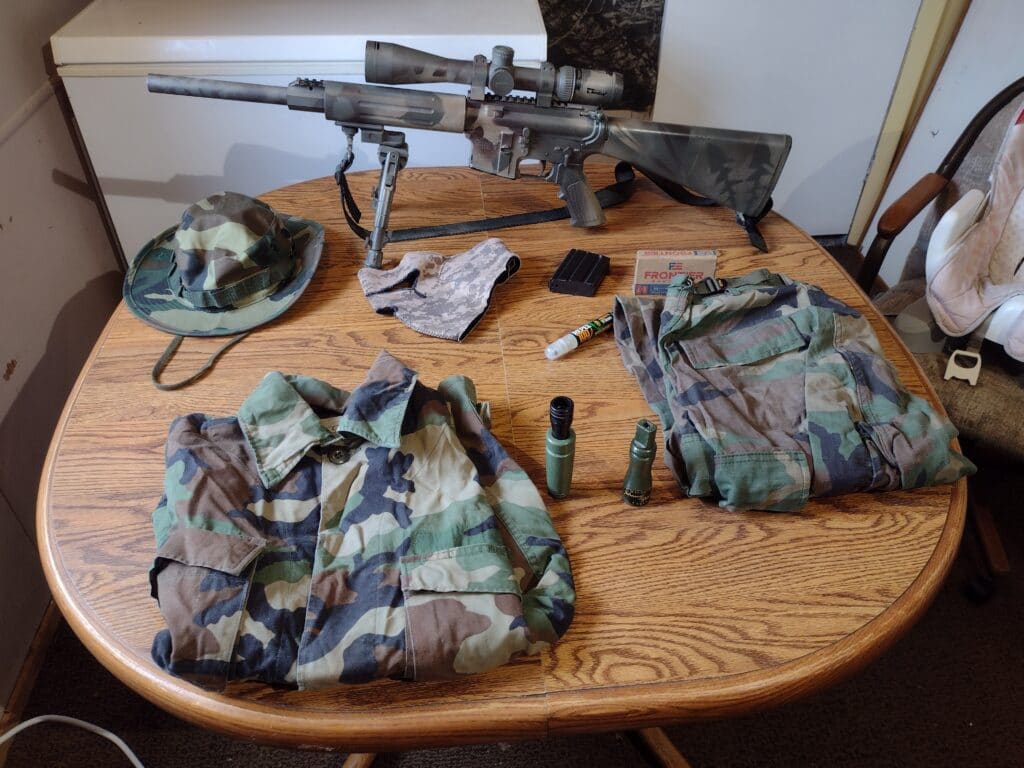
Coyote Hunting Gear, What You Need to Have
What you need is proper camo, applicable footwear, a gun, and a call. Your budget can be as big or small as you have to work with.
The first and most important piece of equipment is your gun. It doesn’t need to be a fancy gun, or expensive, or decked out in accessories. It just has to be reliable and shoot straight. An accurate rifle can cost $400 upwards. All hunters agree on using scopes as well.
The serious coyote hunters out there usually have highly customized rifles with longer barrels and multiple accessories. These are the guys dedicated enough to spend $1,000 or more on equipment because they are that serious about the sport.
The most popular rifle for coyote hunting is an AR-15 with a free-floated handguard chambered in 223, 223 Wylde, or 224 Valkerie. The 223 is one of the cheapest cartridges most suitable for coyote hunting. The most popular calibers in bolt action are 22-250 and 220 Swift.
Camo is where many hunters often spend more than they need to. Don’t buy something just because it’s name brand. Your first concern with camo is whether or not it will blend in with your hunting spot. Also, make sure that your camo matches your climate.
There are three types of calls used for coyotes: rabbit in distress, fawn bleats, and coyote howls. The most popular and most effective is the rabbit in distress. Fawn bleats are used more in the spring, and some hunters report amazing results with them. The coyote howl is the least effective and is often used to locate other coyotes because they tend to howl along.
There is also a woodpecker distress call, but it’s never been very popular with coyote hunters and seems to be more effective on other species of predators.
Electric calls will help you keep your breath, and are a more natural sound. They play recordings of actual animal sounds. They also keep the coyotes focus off you, and let you keep your hands on your rifle. Electric calls can play dozens of different sounds from a single unit.
As far as footwear goes, just make sure they’re not so dark or so light that they stick out. Brown, tan, or camo shoes and boots all work well. Now, let’s go on to the most popular gear used today.
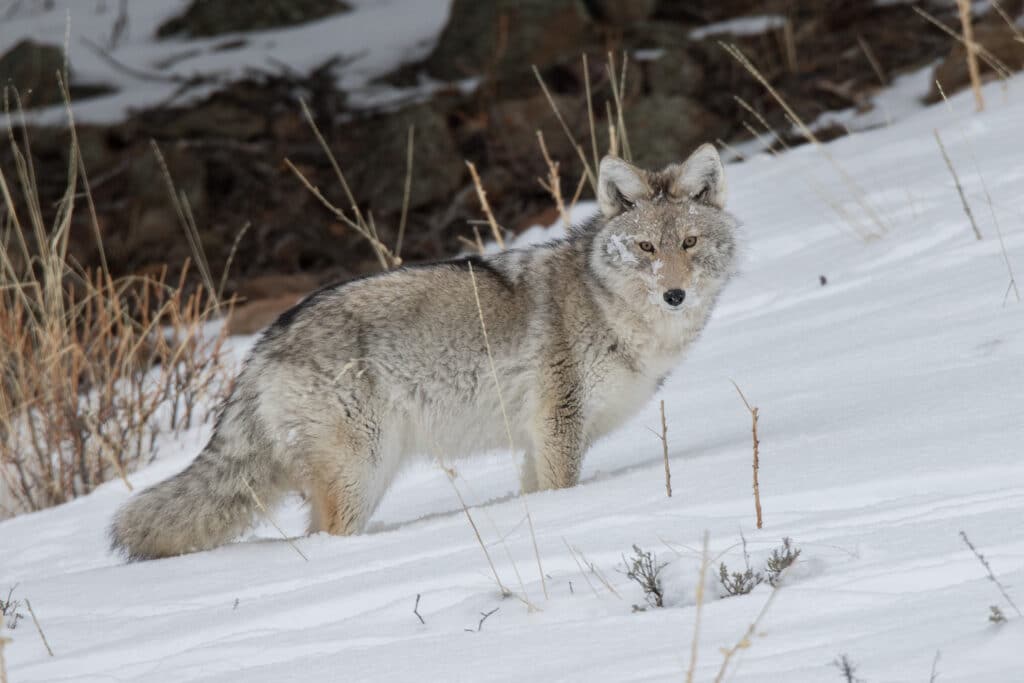
Best Value Gear List
- Ruger American Predator 223 $450, or GFLA .223 Wylde Rifle $750
- Sightmark Wraith $450, or BARSKA 4-16x60mm IR Euro-30 Pro $180
- Bog DeathGrip shooting tripod $140
- Basic nylon rifle sling $10
- Predator Camo, pants, jacket, hat and tube mask (best colors for your area) $$varying
- Primos Still Cottontail call $9
- Primos Mouse Squeeze call $9
- Iotec GC300 Electric Predator Call $100
- Hornady Varmint Express ammo $30
- Hunter’s Specialties 5-color camo face paint $7
- Repell 100 bug spray (98% DEET) $7
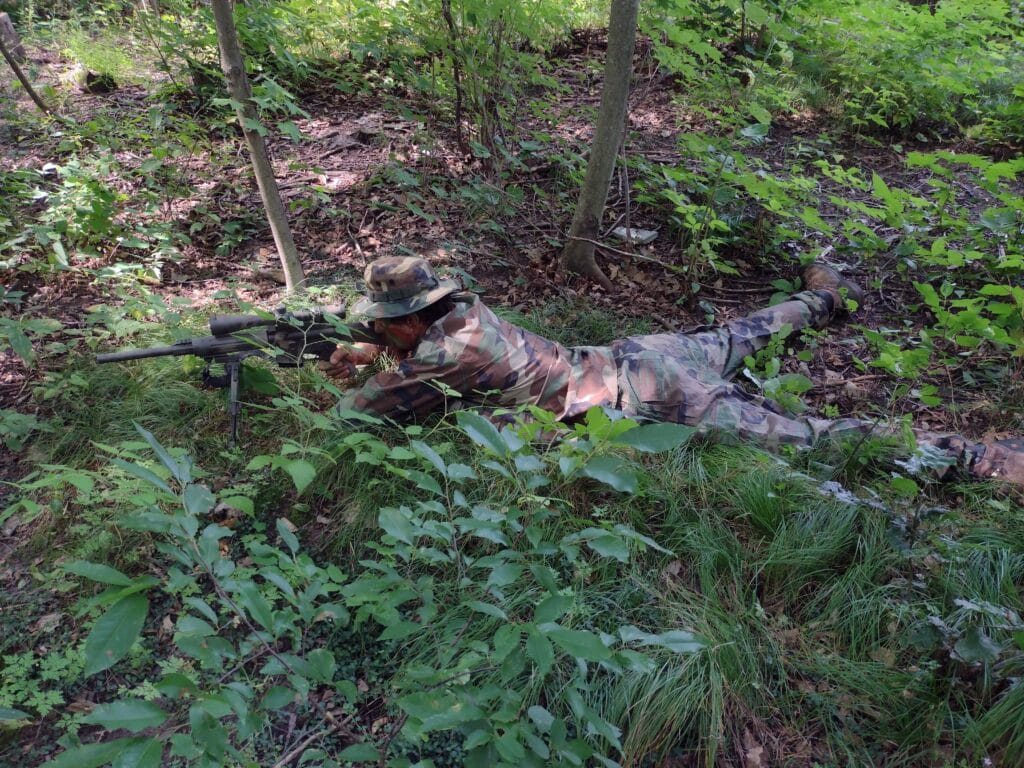
Rifles For Coyote Hunting
The most popular rifle for coyote hunting is the Ruger American Predator and a free-floated AR-15 in 223. The Ruger Predator is cheaper, but the AR-15 allows you to customize more and to make follow-up shots quicker.
I’m a big fan of The Ruger American Predator. Everyone who shot it has only kind words to say about it. It’s the most widely recommended predator rifle for good reason. It’s affordable, solid, and accurate as all get out. Plus, the barrel comes threaded to attach a sound or flash suppressor.
I prefer the AR-15 because it’s the most reliable and accurate semi-automatic rifle on the market today. it’s just better-suited to predator hunting. Not all ARs make good coyote rifles. It really needs a free-floated handguard, sometimes mistakingly called a free-floated barrel.
Nowadays, these are pretty common. Most come with a rail down the top of the receiver and handguard, and accessory attachment points along the sides. A good AR is expected to shoot at or under 1 MOA.
My personal rifle is a DPMS with a 16-inch stainless heavy barrel, and it’s free floated. It came black, with shiny stainless steel, so I did my best work with spray paint. Now, I could lose the rifle if I sat it down in the woods. But, right now I’m saving up for a different one, a better one.
Recommended AR-15 for Coyote Hunting
The Best AR-15 for coyote hunting is the GFLA .223 Wylde Rifle. It’s free-floated, has quality machined, well-fitted receivers, and a precision heavy barrel. The rifle is a good value, the company is meticulous, and customer service is second to none.
That’s a bold statement to make, but I can say it with confidence. I’ve looked everywhere and tried so many options, but none have customers as satisfied as GFLA (Great Lakes Firearms and Ammo). They started small but have been getting really popular in Michigan, Indiana, and Ohio. This rifle costs $750, plus any applicable transfer fee charged by your local FFL.
The rifles are sweet shooters in every model and caliber offered. They are very accurate and well-tuned rifles. They come with a really nice finish, available in several colors, and the 223 Wylde chamber performs very well with both 5.56 and .223 ammo.
GLFA is a gun shop in Sparta Michigan that manufactures its rifles completely in-house. They make all parts except for a few screws. They will ship rifles to any FFL in the US. Check them out online at glfallc.com. Here is a link to the GLFA .223 WYLDE. No, I didn’t get paid to say that.
So, for the same price as a basic configuration AR-15 from Ruger or PSA, you can get a really nice, free-floated, heavy barrel 223 Wylde from a very popular local shop. Honestly, the high-class hunters who always buy the absolute best of everything; they shoot GFLA around here and brag about their 200-yard plus coyote kills.
Coyote Hunting Optics for Night and Day Hunting
The Sightmark Wraith is the best value in night vision scopes for both day and nighttime coyote hunting. It’s durable, has a clear picture, and records your hunt for later viewing. It sells for around $450. For daytime hunting only, the BARSKA 4-16x60mm IR Euro-30 Pro is a great choice.
Coyote hunting pretty much requires a scope. Hunting at night can only be done with night vision or the more expensive thermal vision. I’ve tried a number of scopes at different price ranges and found some pretty nice ones.
Currently, my scope is a Vortex Viper HS 4-16×44. It’s very nice, pretty durable, and has a very clear picture. It adjusts focus and magnification easily. It’s pricey, at $550, but it’s comparable to a $1,000 Leupold. Plus, it has a no-questions-asked warranty.
It’s a very good scope if you want the best value in quality precision. I went with the 44mm objective (front lens) over the 50mm because I have a small head and want the scope mounted really low to the rifle. The 50mm will raise the scope up a tad and will gather more light for better dawn and dusk use.
If you’re looking for a good sub-$200 option, check out the BARSKA 4-16x60mm IR Euro-30 Pro. It has super clear glass, a large objective for extra light-gathering, and an illuminated center reticle. This scope sells for $180 and will give the most function in low-light conditions.
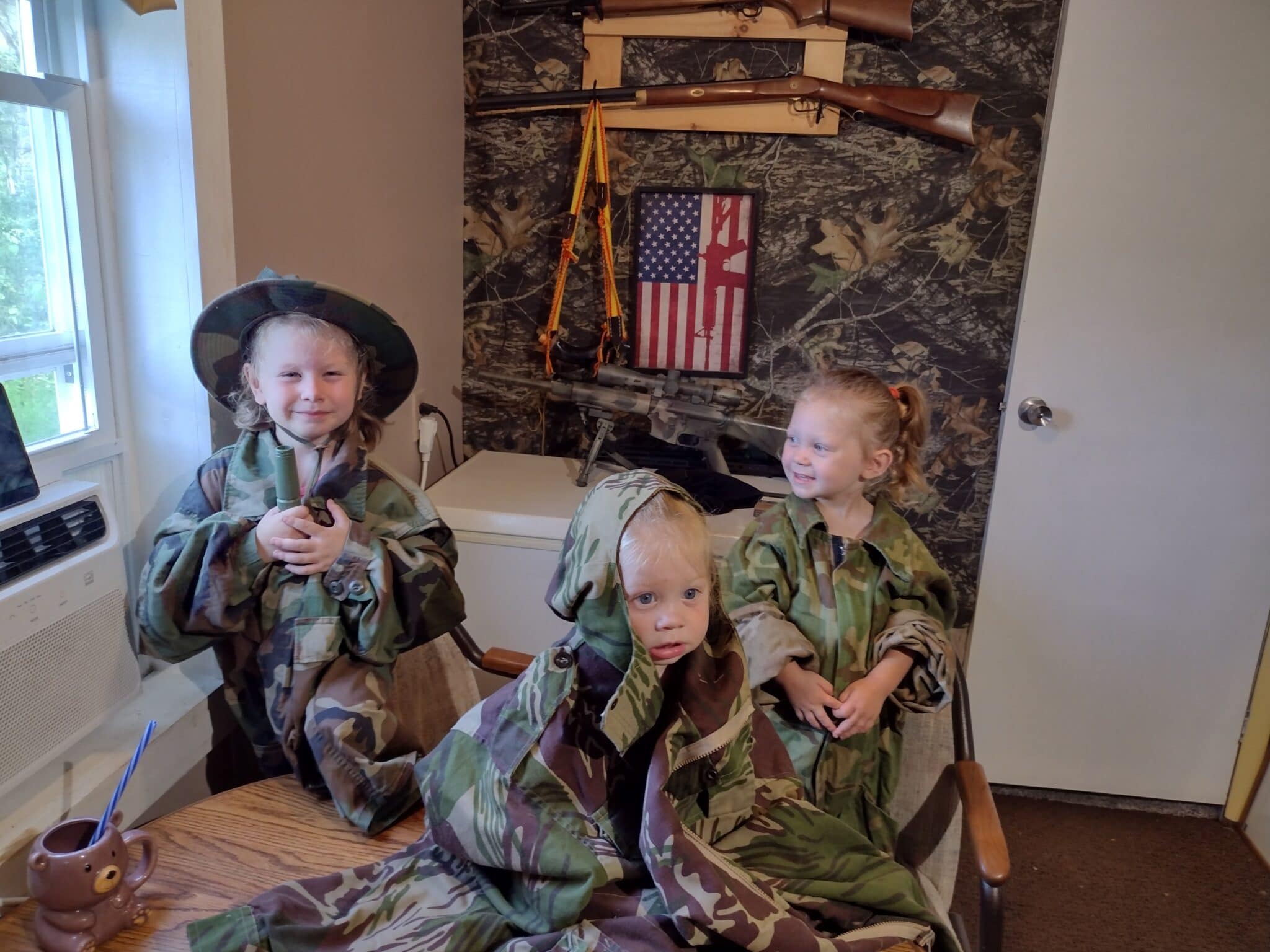
Best Camo For Coyote Hunting Success
The most popular are Mossy Oak and Realtree, but Predator Camo is arguably more functional and better priced. Predator uses a lighter pattern than most and has patterns for every hunting environment. Predator is some of the best value camo for coyote hunting.
Many attentive hunters have been saying for years that most camouflage is too dark for practical use. I agree wholeheartedly. Most camo patterns are designed to mimic the colors of the woods. The woods are dark and shady, so all the colors appear dark. But, they actually aren’t. They’re just in the shade.
Many camo patterns, like the old Realtree and Mossyoak, are very dark. They usually stick out, especially when in the sun. I’ve laughed numerous times when driving by a field because I could see a hunter in the treeline 200 yards from the road. they tend to stick out like a dark spot.
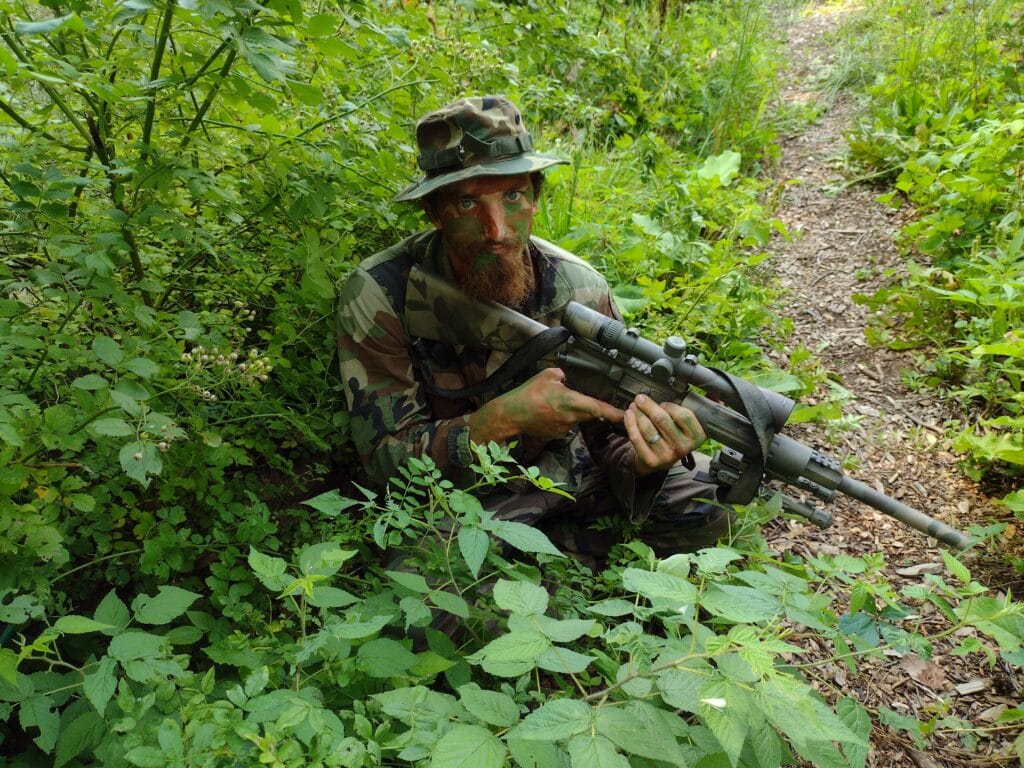
I’m going to give you a great tip: Test out your camo before the hunt. Grab your hunting buddy and go to your hunting location. The two of you should see what it takes to hide from each other while keeping a clear view of the area. Mimic your hunt and see if you can stay concealed. Concealment is 50% camo, 50% remaining still, and the other half using available cover.
The most common colors in the woods are bright green, grey, and varying shades of browns and oranges depending on the season. Dark camo looks dark in the woods and in the fields. Light camo looks dark in the woods (because it’s in the shade) and light in the sun, just like nature.
Really, you have to match your camo to your area’s color scheme, remembering that it changes with the season. Most hunters like two camo patterns, one for fall and one for winter. Up here I need a third; one for snow.
The camo I recommend for most situations is Predator. They use some lighter colors in the mix, and the pattern works really well. They have patterns for different seasons and for different regions. They are also a really good value. Yep, I recommend that stuff. You know it’s good when your hunting buddy decides to hide and you can’t find him.
I also recommend a Multicam pattern for general use, and personally favor a traditional woodland pattern at times (I hunt mainly in the deep woods). You can get some cheap and durable Multicam for a good price. It’s not just for military use, It’s a good all-around camo option.
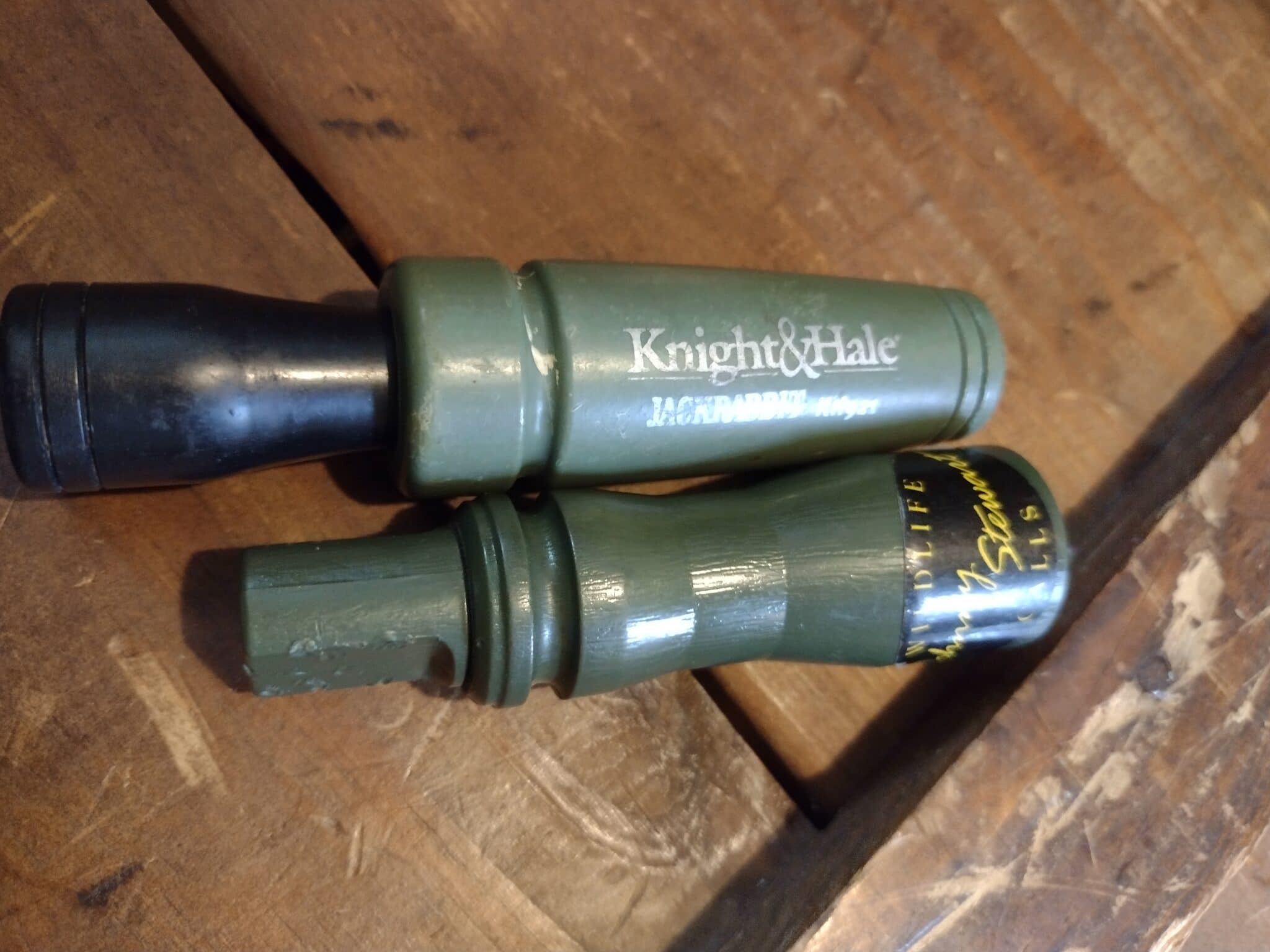
Calls For Coyote Hunting
The best value in electric coyote calls is the Iotec GC300, which sells for under $100. It’s rugged, reliable, and has good battery life. The best hand calls are the Primos Still Cottontail Rabbit Call and Primos Mouse Squeeze. Both complement each other well and they are less than $20 together.
Most hunters today prefer electric calls. they are more expensive, $100-$500, and can be a hassle to carry, but they do the job of calling for you and always sound like the real thing. Another point of electric calls is that you can set them up 50 yards away from where you are sitting. This means that a coyote won’t be honing in on your location, but the location of the caller.
It also means that you can concentrate more on making a good, safe shot. They make success come easier. Just be sure to have a hand call or spare battery around for when you forget to charge it.
The last electric call I used weighed 20 pounds and played cassettes, so I’m not the pro on them. However, my friends over at Michigan Coyote Nation highly recommend the Iotec GC300 as the best value in an electric call. For $70 more, you can get the model with a little dust bunny-looking decoy that thrashes about. That really helps bring in the canines.
Hand calls are pretty simple but require you to learn how to call, and to develop a calling sequence. The most important things to get right are the tempo and the hand fluctuations. You use your hand on the bottom of the call, opening and closing it around the base to manipulate the volume and tone.
The best thing to do is watch youtube videos of such sounds in nature. Then you can practice imitating them. Here is a video to listen to, but don’t play it on full volume or at a family get-together, or else someone will panic.
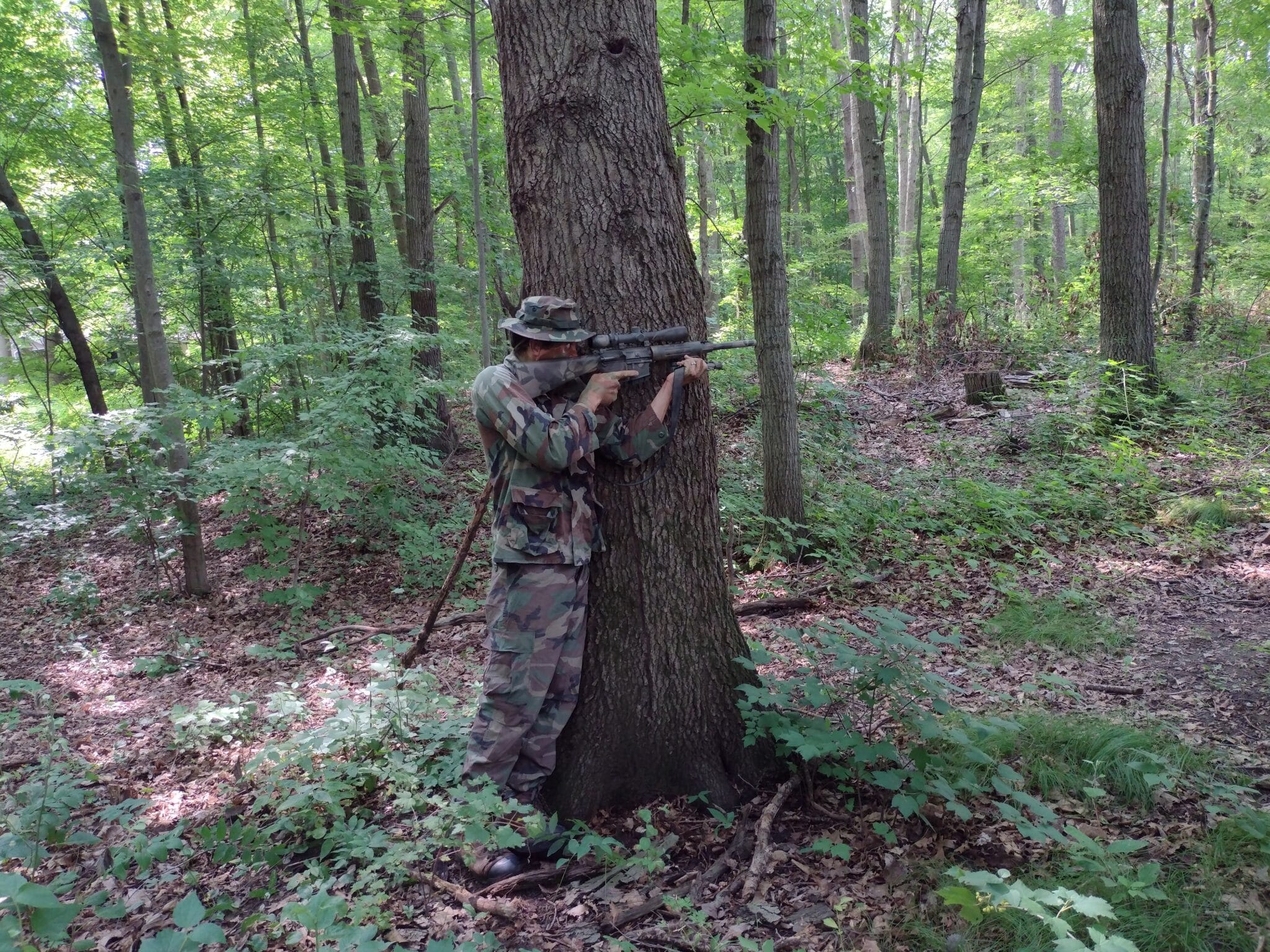
Facepaint, Masks, and Gloves
I always hut with camo on my face and hands. Coyotes have a good set of eyes, and the solid color of skin can flag them away. You really need some camo on both your face and hands. There are two options, facepaint or fabric.
The camo paint is a reliable option, and honestly, I like it because it feels like I’m putting on war paint. it is usually pretty oily, and comes off easily if you touch, scratch, or smear. I prefer paint on my face instead of a mask because I find it more comfortable.
I prefer the 5 color Hunter’s Specialties makeup kit. It’s a flip-open container with all the colors you need, and a small mirror to make sure you get enough on. It’s applied with your fingers. Use it to darken or lighten your skin to better match your surroundings and break up the solid color of your face.
After wearing camo paint for a few days, it can leave you looking strangely tinted and almost looking bruised for a day or two. If you put it on heavy, it can be tricky to get it all off. Soap and warm water take it off pretty well, and wet wipes work fairly well too.
I’ve used camo paint on my hands too, but only on the back of my hands. Put it on the front and everything you touch will get greasy, and your gun will end up pretty grimy. You can just make a big smudge on the back of your hands to help them blend in.
A lot of hunters hate the face paint, saying that it’s too messy. There are some great masks and gloves that to use instead. In most instances, you’ll want a mask and gloves to be thin and lightweight. Too thick of gloves make it hard to manipulate your gun. A thick mask is hot and can be harder to breathe in.
It’s best to try on a particular mask or gloves before you buy to see if it’s actually something you can bear wearing for several hours straight. There are tons of different masks and gaiters available online. Most of them are made the same. Just look around for the best pattern to match your hunting area. Personally, I’ve had my fill of masks for the rest of my life.
Now gloves, those I’m a bit picky about. Gloves need to be shootable. I need to be able to manipulate my weapon with them on. Most hunting gloves are very thin, and they should be. My favorite one has an open-ended trigger finger. That is a need in my opinion.
Most hunting gloves don’t come with an open-tipped trigger finger. If I can’t get gloves that do, I’ll snip it off myself. If you’re okay doing that, any and all colors and camo patterns become available. As with any other camo, buy what best matches your surroundings.
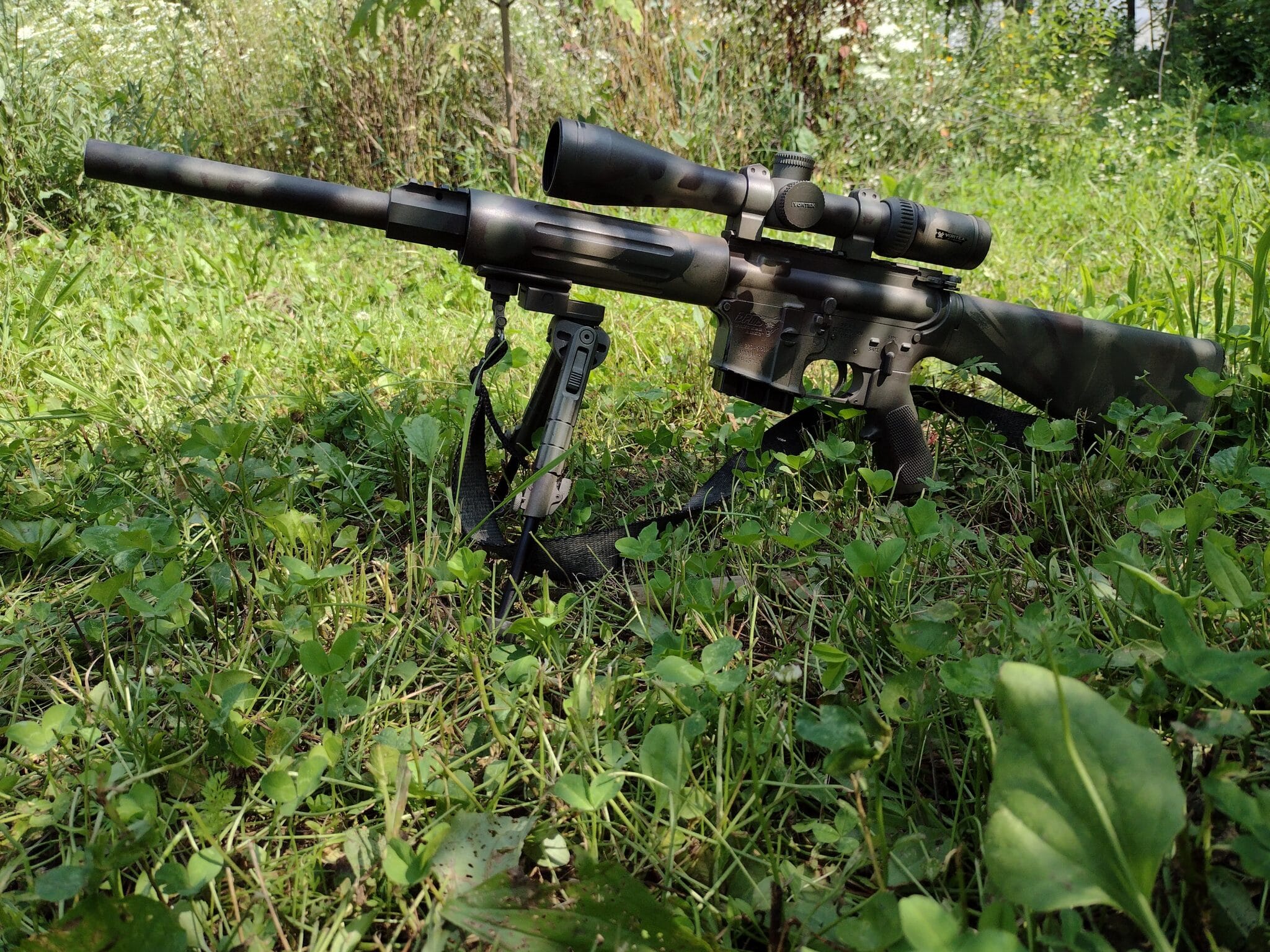
Sticks, Bipods, Tripods
The most popular rifle support among serious coyote hunters is a shooting tripod like the Bog Death Grip. They hold the rifle steady, making nighttime shots much easier. The Bog Death is quite popular and can accommodate all positions from prone to standing.
If I need to make a precise shot, I go to the prone position. All I need is a standard, weapon-mounted bipod for that. I like the UTG 8-12 inch Tactical OP Bipod for shooting prone.
Hunting at night, the standing position helps you to stay above weeds and grass that might not show up in your night vision. That’s much more an issue with thermal optics.
A steady rifle makes a better shot. Support makes a steady rifle. I tell my students “you are unskilled if you can’t shoot without a bipod, but you are a fool if you leave home without one”.
If you are considering a shooting stick, I recommend considering something with at least two legs, especially for use while standing. Having the option to go high with rifle support will give you more shooting opportunities, but shooting in a high position makes you much more visible.
